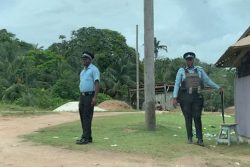It was talked about frequently during the years I lived in the Cayman Islands, but it hasn’t happened yet. I know there is also great concern about it in Barbados, but I don’t think it has come about there either. Last week, however, it did in fact happen in Antigua and Barbuda; the Government of Prime Minister Gaston Brown banned the importation of plastic bags. The ban will be instituted from the beginning of next year. The only exception will be plastic bags used for the collection and disposal of household and other garbage. In the meantime, authorities in the islands’ Ministry of Health are planning to engage the private sector, especially retailers who are heavy users of plastic bags, to come up with alternatives. The Antiguan government says it will go as far as waiving duties and other taxes to assist businesses to make the transition. Some supermarkets are already proposing a switch to recyclable bags.
In Guyana, where we have recently seen a number of many commendable clean-up efforts, particularly noticeable in Georgetown and environs, we have been especially vulnerable to the plastic flood, and the Antigua and Barbuda action should spur us to urgently revisit similar suggestions raised here before about the banning of these non-degradable materials such as plastic and, our particular nemesis, the styrofoam blocking our canals, trenches and drains. Along with every country in the region, Guyana is grappling in various ways with the environmental challenges posed by plastic bags and other containers made of these materials which remain intact for years across our landscape and in our waterways and ocean tides.
 Previous intimations about such a ban here have come to naught, perhaps partly because of our accepting the convenience of the throwaway container material provided by the stores. While I am not always without sin myself, I will often avoid the plastic bags that come automatically with a local purchase, but what is interesting is the reaction my refusal stirs. “Are you sure?”, is a frequent response, and while there is no edge to the exchange one is left with the impression that the “no thanks” is seen as something unusual, if not actually odd; the “gimme a bag” practice is clearly strongly entrenched here. Despite all the appeals from the concerned few, it is part of the way we live, and the plastic flood continues even as the results confront us daily.
Previous intimations about such a ban here have come to naught, perhaps partly because of our accepting the convenience of the throwaway container material provided by the stores. While I am not always without sin myself, I will often avoid the plastic bags that come automatically with a local purchase, but what is interesting is the reaction my refusal stirs. “Are you sure?”, is a frequent response, and while there is no edge to the exchange one is left with the impression that the “no thanks” is seen as something unusual, if not actually odd; the “gimme a bag” practice is clearly strongly entrenched here. Despite all the appeals from the concerned few, it is part of the way we live, and the plastic flood continues even as the results confront us daily.
A week or so ago, after an absence of some five years, some government workers with an excavator dredged the trench that provides drainage behind our house and did an impressive job shaping and leveling the parapets on either side which had become densely covered in bush. Subsequently, at the rear of our house lot, I saw first-hand the impact of those innocuous-looking plastic bags we bring home from the supermarket. One of them, adrift in the neighbourhood, had floated our way and ended up combining with some tree leaves to block the 4-inch pipe draining the property to the south. I was surprised at how effectively, that seemingly flimsy piece of plastic was able to hold back the considerable volume of water that usually flows naturally to the trench leading to the Ogle koker; I was in water up to my ankles. One does not have to imagine the far greater blockage that would result in similar circumstances from the more rigid styrofoam material; a casual look at several Georgetown locations provides that evidence almost any day in the week.
There is very little debate about the degradation from the litter; the problem seems to be in the area of achieving the regulation now coming to Antigua and Barbuda. Our approach to solving this litter problem will clearly have to be managed by our leaders in a way that requires us to follow, as has been done in other countries such as Canada, when I lived there, and now in our region. There is, however, an additional aspect to all this.
A significant part of the environmental concerns originally referred to in the region was the presence of tourism in those economies. In my time in Cayman, with my exposure to tourism, I was repeatedly struck by the vehement reaction from visitors to litter anywhere in those islands. They would complain angrily to the staff of the hotel or restaurant – I have heard them.
They would write stinging letters to the Tourism Office and to the two local newspapers – I have read them. They would even corral individuals in casual encounters and suggest to them that they should be more concerned for the condition of their country – I heard those in the Festival Office. But they didn’t stop there. They would raise the subject in their blogs – these people were on a mission – and would even make comments in their home-town newspapers.
So as much as we sit in Guyana now on the cusp of a tourism push to diversify our economy, that should be all the more motivation to keep this aspect in mind. Yes, the visitor wants effective and affordable airlift, and the absence of crime, and good accommodations, and diverse attractions, and will be drawn to those things. But that same visitor will be repelled by our garbage-strewn environment, and our drains with stagnant water and his/her desire to vacation with us will wilt like some callaloo in the August sun. Furthermore, that visitor will actually castigate us for living year-round in these conditions and for seemingly remaining indifferent or blind to the degradation. If we’re seriously courting the tourism market, as we seem to be, we should learn from the experience of other tourism countries and heed the example being shown to us by our regional brethren.
The Caribbean news release about the plastic ban by the Gaston Brown regime had this passage: “Antigua and Barbuda’s bold stand for environmental preservation is commendable and serves as an inspiration to other countries looking for a solution to the plastic bag problem. As small island states, Caribbean countries are heavily dependent in so many ways on maintaining a pristine environment. It is vital, for example, for the continued viability of tourism, our No.1 foreign exchange earner. Just as environmental degradation is a turn-off for visitors, it should also be for us ourselves.” Those are sentiments we should embrace.









